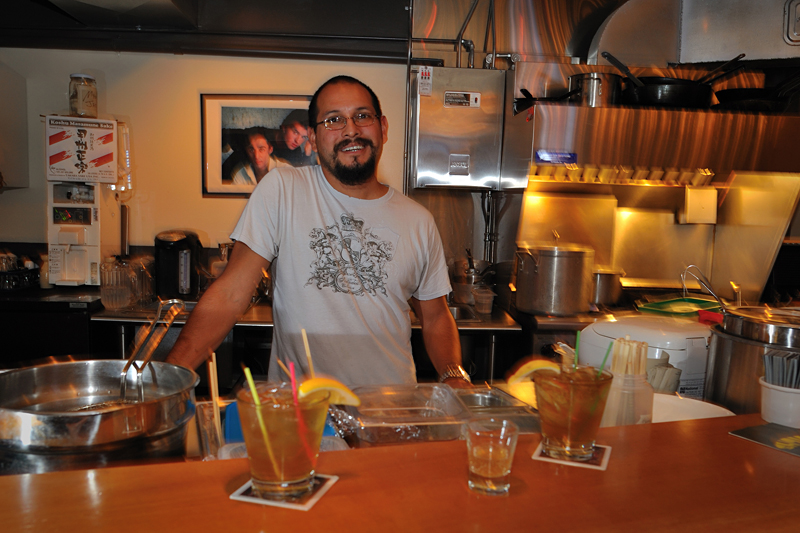On a nice day, former Deputy Mayor Tim Ceis would have a view encompassing Bainbridge Island, ferries, and Seattle’s skyline from his seat at Pioneer Coffee across Harbor Avenue from Alki Beach. But beyond the door, the beach ends in a grey haze of clouds and waves, and the dicey weather makes the cafe feel as though it exists at the edge of the world.
“There is no truth to the rumor that I arrived with the Denny Party,” Ceis quips. “My dad did, though.”
In truth it was his great-grandfather who grew up in a house not far from where Ceis is sitting. His parents still live in the neighborhood, as does Ceis himself. In fact, for four decades, West Seattle has produced politicians who have risen to the top elected positions in the city and the region, steering infrastructure projects and cash to the neighborhood.
If the viaduct’s imminent demise cuts off West Seattle and its approximately 83,000 citizens (as estimated by King County demographer Chandler Felt, using data from the Puget Sound Regional Council and the U.S. Census Bureau) from a mainland that has a tendency to forget the peninsula is part of the city, West Seattleites won’t be worrying. There’s enough political experience and expertise, from local precinct officers to players on the international stage, to keep the peninsula humming all by its lonesome.
It wasn’t always that way. Fifty years ago, West Seattle tended to be left out of city politics. It was too disconnected physically and politically from the rest of Seattle, lurching further right than the mainland, Ceis explains. His father, Philip, was a rare far-left liberal in the neighborhood in the 1940s and ’50s, and for a time the family suffered for it. A member of the communist party, Philip was dragged before a regional branch of the House Committee on Un-American Activities. It kept his father from getting construction jobs, Ceis says. Even as a child, he adds, “there were people who wouldn’t let me come to their house.”
But that didn’t deter the Ceis family’s political activism. Tim’s mother, Margaret, joined forces with other progressive-minded Democratic women who thought city government wasn’t doing a good job of taking care of a burgeoning city, especially its west side.
Phyllis Lamphere was one of the women working with Margaret Ceis to reinvigorate the West Seattle Democrats. Lamphere moved to the neighborhood with her family in 1953 and provided a much-needed tie between West Seattle and the rest of the city. “My family was always involved in the city; most of my family worked for the city,” she says.
An active member of the city Democratic Club and the League of Women Voters, Lamphere didn’t start out as a neighborhood advocate. In 1965 and 1966, she worked on various campaigns, including one to get the state to allow the city to switch to a strong-mayor system of government—something that would hugely benefit West Seattle decades later. During that time she also took various appointed positions, including a spot on the now-defunct city air-pollution-control board.
In 1967, Lamphere ran for city council. She says she didn’t think of it as running to create a neighborhood council seat. Nor did she have much trouble getting elected. Thanks to her involvement in in a variety of civic activities, she was well known throughout the city. “When I became active in the Democratic Party in West Seattle, we had some pretty powerful legislators, but I don’t believe that they had a big enough vision for the city,” she says. “I was in the thick of it, so to speak.”
Ironically, around the time Lamphere finally snagged the peninsula a voice in city government, a group led by the local Chamber of Commerce circulated petitions to secede from the city. “It was sort of half-serious and half-promotional fun,” says Clay Eals, a former West Seattle Herald reporter who edited a book on the history of West Seattle called West Side Story. “It was all about transportation.” The West Seattle Chamber of Commerce had been fighting for a higher bridge spanning the Duwamish, but, despite Lamphere’s presence on the council, didn’t yet have the clout to make it happen through normal political channels.
The petition got about half the signatures needed to put secession to a vote. But it would be wrong to characterize it as a failure, as it accomplished something more important: It got business leaders to join forces with the left-leaning women in the interest of West Seattle.
King County Executive Dow Constantine, who grew up in the neighborhood and still resides near his boyhood home, says West Seattle’s vast number of active groups, from the local Democrats to the West Seattle High School Alumni Association to business owners to the many churches, create a more cohesive voting bloc than in other neighborhoods. The groups “reinforce each other and create a sense of sort of shared purpose,” he says. “People who don’t really line up with me philosophically or politically are willing to support my candidacy for office because I understand them. I understand where they come from; I understand what they think. I’m one of them.”
After a new West Seattle Bridge was opened in 1983 (the old one proved to be too short when a drunken ship captain, Rolf Neslund, rammed into it), the neighborhood exploded. New businesses and homes began to spring up all over the west side, and younger families started moving in. California Avenue began to evolve from a stretch of moribund storefronts to a collection of clothing boutiques and record stores—though some longtime stalwarts, like Husky Deli, have weathered all fronts.
It was in the changing political climate of the ’80s that a former aide to then-mayor Norm Rice decided to take a shot at unseating the patron of west-side politics, King County Councilmember Robert Grieve. Greg Nickels arrived in West Seattle from Chicago at age 6. His family lived there briefly before moving to Capitol Hill. In 1979 he returned, newly married at 22. West Seattle had the advantage of affordability, and “it was more home to me,” Nickels says, speaking by phone from New York, where he’s recently completed his latest adventure in international visibility as a presidentially appointed public ambassador to the United Nations General Assembly.
Nickels had been heavily involved in politics since joining the Young Democrats at age 16. Working for various local campaigns sent him to the west side on doorbelling trips. But his real introduction to West Seattle’s power elite came in 1985 when he helped his then-boss, city councilmember Rice, run against incumbent mayor Charles Royer. Nickels managed the Rice campaign, while Tim Ceis ran the contest for Royer’s camp. “That was the first time I had a chance to really appreciate his skills,” Nickels says of Ceis. “Appreciate” turned out to mean “suffer defeat at the hands of,” as Royer beat Rice with more than 57 percent of the vote.
Two years later, Nickels decided to challenge Grieve for the latter’s King County Council seat. By then, Grieve had enjoyed the support of West Seattle and the majority of the 34th District Democrats for 40 years, first on the state legislature, then on the council. Grieve represented the more blue-collar, moderate Democrats who had characterized the west side before Margaret Ceis and Lamphere started challenging that ethos.
One of the first things Nickels did was meet with his former campaign rival from ’85. “I took [Ceis] out to lunch and asked him to run my campaign,” Nickels says. “I didn’t want him on the other side again.”
Ceis agreed, and with his powerful family behind Nickels, other union bosses and Democrats abandoned Grieve. Nickels unseated the long-serving politico in the primary, and went on to win the seat. Upon being sworn in, Nickels was careful to maintain the political relationships that got him there. “There were three constituents that you never said no to, and at the top of that list was Margaret Ceis,” he explains. (Nickels won’t say who the other two were.)
The real coup for west-side Dems came in 2001, however. “No West Seattleite had been mayor,” Nickels points out. Incumbent Paul Schell was an easy target after the World Trade Organization fiasco two years earlier, and Nickels and City Attorney Mark Sidran knocked him out in the primary. Three months later, with the support of West Seattle’s thriving political apparatus, Nickels eked out a victory over Sidran.
Ceis swept into City Hall as Nickels’ deputy mayor. Meanwhile, Tom Carr, another West Seattleite who lived within blocks of Ceis and Nickels in the northern Admiral district, was elected City Attorney. Two years later, Tom Rasmussen, who also calls West Seattle home, won a seat on the city council, giving the neighborhood influence in both the executive and legislative branches of Seattle government.
For eight years, the peninsula ruled the mainland. But Nickels developed a reputation for running the city too aggressively. Opponents described him as practicing “Chicago-style” politics, a derisive description around these parts. And after a thick blanket of snow crippled the city just before Christmas 2008, Nickels, Ceis, Carr, and company were booted in 2009 in favor of tunnel-bashing Mayor Mike McGinn and pot-friendly City Attorney Pete Holmes.
Carr left for Boulder, Colo., where he serves as an appointed City Attorney. Ceis is now lobbying the very government he once worked for through his own consulting firm, CBE Strategic. He focuses on civic and transportation issues, like trying to keep the waterfront tunnel McGinn opposes on track. Even more impressively, Democratic state legislators tapped Ceis, known as “the Shark” at City Hall, to represent them on the commission that will decide how to redraw the state’s Congressional districts to incorporate a 10th House seat. Nickels has also enjoyed more national and international prestige than ever, thanks to a fellowship at Harvard University’s Kennedy School of Politics and that appointment to the United Nations General Assembly, which ended last month.
The exit of the Nickels administration hardly spelled the end of West Seattle’s political influence. To the contrary, West Seattle has built upon tradition, keeping its stable of political successors well-stocked.
In 1989, while Nickels was finding his feet on the City Council, West Seattle High School alum Dow Constantine found out about plans to tear up and develop the College Street Ravine, a wooded area where he and his brother played as kids. A neighbor of his parents, Charlie Chong, who would later become a famously populist city councilmember, was fighting with the city to keep the space untouched.
Constantine, who had recently finished law school at the University of Washington and a stint as an intern in the state legislature, joined forces with Chong. While looking for more allies, he ran into Nickels waiting in line at the Admiral Public Library branch. “I recognized him as this young guy who had gotten himself elected to the County Council,” Constantine says of Nickels. “He was a big, big advocate for open-space preservation.”
Nickels was impressed with Constantine’s willingness to follow through on the issue, which ended in the preservation of the ravine. So he hired him as a legislative aide. “I thought it was as important a thing for an elected official as any particular project or thing that you vote on, is to mentor people and give them that opportunity, and then let them go off and make their own mark,” Nickels says.
In the mid-’90s, Constantine set out to make his own name in politics. Under the guidance of Margaret Ceis, he had served as a precinct chair in West Seattle since the late ’80s. Then at a meeting of the 34th District Democrats, long-serving state representative Georgette Valle announced that she would retire. Constantine said he’d run. It would be the only close race of his career, against Valle’s handpicked successor, Sally Nelson. But with the powerful Ceis machine behind him, he eked out a victory, and has been winning elections ever since. In 2000, he successfully ran for the state Senate to replace Michael Heavey, who left to accept a judicial appointment. When Nickels took over City Hall in 2002, he tapped Constantine to fill his former seat on the county council. The council accepted the mayor’s recommendation, and Constantine went on to be elected and re-elected easily before he was elected King County Executive in 2009. In addition to his many electoral victories, Constantine has managed some big political wins in office. Despite budget shortfalls at King County Metro, Constantine managed not only to preserve the West Seattle Water Taxi—a pilot project launched by Nickels—but to convince the council to rebuild the dock on the west side to facilitate year-round service. And after successfully convincing key unions to give up guaranteed pay raises amid a budget crisis, buzz of a Constantine gubernatorial candidacy in 2012 is gaining momentum. (“I may run for governor some day” is all he’ll allow for now.)
A host of potential heavyweights wait in the wings. Another Nickels protégé, Joe McDermott, was one of the sponsors of the bill that granted gay and lesbian couples rights similar to marriage in this state. Last year he made the leap from the state legislature to take over Constantine’s seat on the King County Council. With McDermott on the county council and Rasmussen still serving in City Hall, West Seattle boasts more openly gay politicians in city and county government than any other neighborhood in the city, including Capitol Hill.
McDermott’s move to the council set in motion a series of promotions. Sharon Nelson, a Constantine aide from Vashon Island, took McDermott’s seat in the state Senate. And her aide, a devastatingly handsome 24-year-old from Burien named Joe Fitzgibbon, defeated Heavey’s son to claim Nelson’s former seat in the state House.
It’s been more than 160 years since the Denny Party first landed at Alki, planning to build a new New York. They intended to make West Seattle, before it was ever known by that name, the center of a logging empire. But it didn’t work out. The winds buffeting Alki’s shallow shores made it too difficult to use the peninsula as a base of operations, and a year later they had moved to the other side of Elliott Bay.
Nowadays, Pioneer Square, the place where the Dennys finally launched their business and laid the foundation of the Emerald City, is struggling with its identity, while West Seattle keeps churning out new businesses, residents, and politicians of local, national, and even international significance. It would seem the Denny Party had found the right location for the city’s power center—just a few generations too soon.







